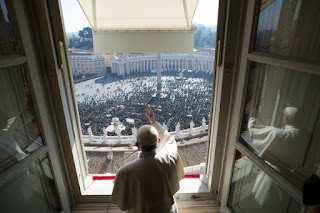Angelus Address: On the Parable of the Householder Who Calls Labourers to His Vineyard “God Wants All to Work for His Kingdom; He Wants to Give All the Same Recompense: Salvation and Eternal Life”
Angelus Address: On the Parable of the Householder Who Calls Labourers to His Vineyard
“God Wants All to Work for His Kingdom; He Wants to Give All the Same Recompense: Salvation and Eternal Life” September 24, 2017
Dear Brothers and Sisters, good morning!
In today’s evangelical page (Cf. Matthew 20:1-16) we have the parable of the labourers called for the day, which Jesus recounts to communicate two aspects of the Kingdom of God: the first, that God wants to call all to work for His Kingdom; the second, that at the end He wants to give all the same recompense, namely, salvation, eternal life.
The householder of the vineyard, who represents God, went out early in the morning to hire a group of labourers, agreeing with them a salary of one denarius for the day: it was a just salary. Then he went out again in subsequent hours — he went out five times that day — until the late afternoon, to take on other labourers that he saw unemployed.
At the end of the day, the householder ordered that one denarius be given to all, also to those who had worked a few hours. Naturally, the labourers taken on first lamented, because they saw themselves paid the same way as those who worked less. However, the householder reminded them that they received what had been agreed. If then, he wished to be generous with the others, they mustn’t be envious.
In reality, this “injustice” of the householder serves to cause, in the one listening to the parable, a jump of level, because here Jesus doesn’t want to speak of the problem of work and the just salary, but of the Kingdom of God! And this is the message: there “are no unemployed in the Kingdom of God, all are called to do their part; and at the end there will be for all the compensation that comes from divine justice — not human, fortunately! –, that is, the salvation that Jesus Christ acquired for us with His Death and Resurrection; a salvation that’s not merited, but given, by which “the last will be first, and the first last” (Matthew 20:16).
With this parable Jesus wants to open our hearts to the logic of the Father’s love, which is free and generous.
It’s about allowing ourselves to be amazed and fascinated by God’s “thoughts” and “ways,” as the prophet Isaiah reminds, which are not our thoughts and are not our ways (Cf. Isaiah 55:8). Human thoughts are often marked by egoism and personal gain, and our anxieties and torturous ways are not comparable to the wide and straight ways of the Lord.
He uses mercy – don’t forget this: He uses mercy –, He forgives widely, is full of generosity and goodness, which He sheds on each one of us, opens to all the boundless territories of His love and His grace, which alone can give to the human heart the fullness of joy.
Jesus wants to make us contemplate the look of that householder: the look with which he sees each one of the labourers waiting for work, and he calls them to go to his vineyard.
It’s a look full of care, of benevolence; it’s a look that calls, that invites to rise, to get on the way, because He wants life for each one of us, He wants a full, committed life, saved from emptiness and inertia.
God doesn’t exclude anyone and wants each one to reach his fullness. This is the love of our God, of our God who is Father.
May Mary Most Holy help us to receive in our life the logic of love, which frees us from the presumption of meriting God’s recompense and from a negative judgment on others.

Comments
Post a Comment